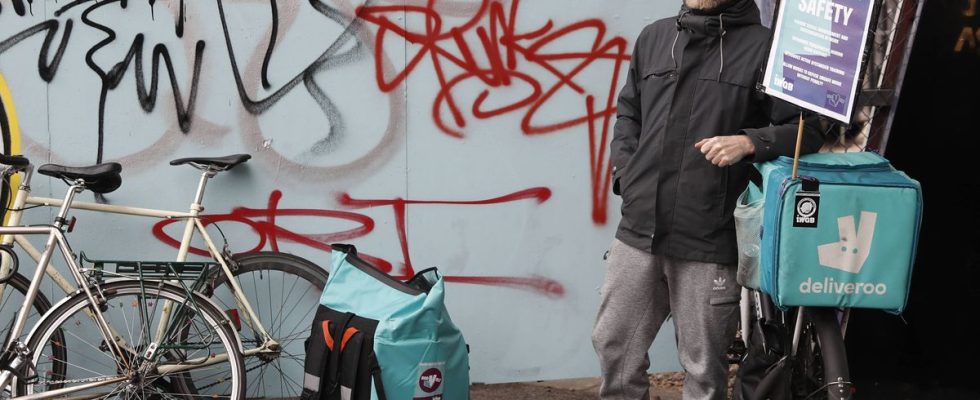Armed with a large cubic bag, stamped Uber Eats or Deliveroo, bicycle delivery men travel daily through major cities in France. Massed in front of the 56,300 establishments who use this service (in January 2023), many of these independents are from immigrant backgrounds or even in search of papers. And yet, not a word of the immigration law, which reached an agreement in the Joint Committee this Tuesday, mentions them. They are entirely hidden from the section dedicated to regularization through work.
“The only mechanism of regularization through work is that which comes from Hortefeux law in 2007 then the Valls circular in 2012, which obviously did not foresee the case of self-employed people,” underlines Serge Slama, professor of public law at Grenoble-Alpes University. To qualify for regularization, you must therefore have proof of salaried work and the immigration law requires eight pay slips. However, the delivery drivers, who are independent, are paid by invoice.
A “complete void” for more than ten years
If employment as a gateway to obtaining papers made sense in 2012, the Uberization of society has since largely pushed the walls of the definition of work. “There is a complete void while delivery people are among the first to be affected,” laments the LFI deputy for the 2nd constituency of Loire-Atlantique, Andy Kerbrat. It is difficult to know how many couriers are undocumented or waiting to obtain asylum, out of the nearly 180,000 recorded as of January 1, 2022. The phenomenon is, however, known.
“We have delivery and undocumented members,” confirms Fabian Tosolini, national delegate in charge of platform workers at Union-Indépendants. In March 2022, the State signed a charter to fight with delivery platforms against illegal work, leading to the suspension of thousands of accounts. The union reacted and asked the State for “the possibility for an independent worker to obtain regularization through work by justifying their turnover received by the platforms in the same way as employees”, recalls Fabian Tosolini. A request that remained a dead letter.
A “dogmatic” law criticized even at Medef
While the executive has struggled to adopt a new version of its immigration law, rejected in the National Assembly without discussion on December 11, delivery workers “will not a priori fall within the scope of the law, even if there will certainly be circulars afterwards,” whispers Serge Slama. “It’s scandalous,” exclaims Fabian Tosolini. We’re talking about people who work, who contribute to Urssaf, who pay taxes and who have supported the catering sector during the pandemic and today we tap them on the shoulder and tell them: “the exit is that way.”
“Foreign workers are no longer the priority of this commission. His priority is to enforce Marine Le Pen’s program,” says Andy Kerbrat. After an agreement was reached, the leader of the National Rally welcomed an “ideological victory” for her party. “It’s a completely irrelevant and ideological debate”, underlines Serge Slama while Fabian Tosolini evokes “dogmatic positions”. This Tuesday, the president of Medef himself expressed concern about the lack of labor, stressing that the French economy will “massively” need foreign workers in the years to come.
Continue to “outsource on site”
However, making two-wheeled delivery people invisible has advantages for some. “Many economic sectors rely on employing underpaid undocumented immigrants. If meal delivery platforms controlled the regularity of delivery people, they would have 80% fewer couriers! », assures Serge Slama who adds that this “informal economy” allows platforms to “relocate on site”. “Obviously there is a temptation on the part of the platforms to look to the side,” admits Fabian Tosolini who nevertheless recalls that recently “all the delivery people said no to the delivery rates imposed by the platforms”. At the beginning of December, Unions-Indépendants and the CGT called on couriers to mobilize for better pay.
But, “Darmanin’s bill expressly provides for making access to self-employed status conditional on a residence permit”, which was not “so clear” until now, recalls Serge Slama. At the risk of pushing undocumented workers to use stratagems in which they are doubly exploited. Many undocumented delivery drivers rent official accounts, for 150 euros per week, to be able to work. “Rather than allowing an improvement in the working conditions of all these delivery men and allowing them to contribute to the national effort, we are tipping them into mafia networks,” sighs Fabian Tosolini.

